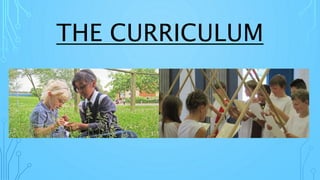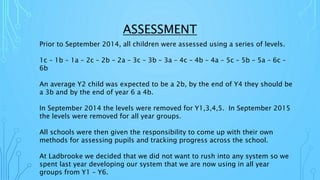The document summarizes changes to the curriculum and assessment at Ladbrooke JMI School since 2014. Key points include:
- The curriculum is focused on core subjects like maths, English, science and foundation subjects taught through topics. Assessment focuses on key performance indicators rather than levels.
- Students are assessed at the start and end of units to identify strengths and gaps and guide instruction. Reports to parents outline progress in objectives.
- End of year assessments determine if students are below, developing, secure or exceeding expectations in core subjects like reading, writing and math. This replaces levels and tracks growth from key stage to key stage.


















